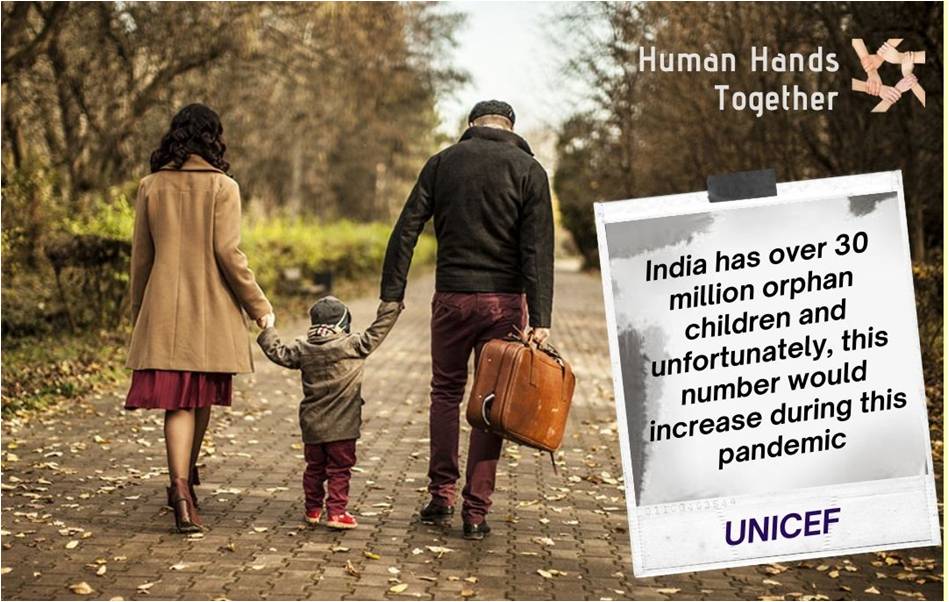- Akrity Aishwarya
Advocate, Patna High Court
Unfortunately,
the dreaded pandemic has left many children extremely vulnerable, particularly
those who have been orphaned. According to UNICEF, India has over 30 million
orphan children. [1] This number would increase during this pandemic. There are
the reports wherein, Child helpline number has recorded several calls for
children whose both parents succumbed to COVID-19. [2]
The
Constitution of India mandates State to ensure to children equal opportunities and
protection against exploitation, moral and material abandonment. [3] The
fundamental rights enshrined under Indian Constitution also guarantees rights
to equality, to protection of life, to personal liberty, and against
exploitation to children. [4] In addition to this, India retified the United
Nations (UN) Convention on the Rights of the Child, [5] thus protections
afforded to children became a legal mandate of all authorities and Courts. Moreover,
India is also committed to achieve Sustainable Development Goals (SDGs) and target
3 specifically emphasis on good health and well-being for all. Furthermore, it
is a duty of every citizen to protect the child from trafficking and in
eradicating any form of exploitation.
Every
day we come across messages or posts on our social media accounts regarding
adoption of orphaned, surrendered and abandoned children who have either lost
their parents due to COVID-19.Any such adoptions made through online posts or
messages are illegal as it can be a trap for gullible persons in order to
extort huge sums of money. These adoptions can also lead to legal proceedings
even if the intent was to help the vulnerable. For the future of societies, it
is vital that orphans, who may suffer irreparable losses if left at the mercy
of the wrong people, are looked after. This article discusses the laws and
procedures pertaining to handling and adoption of an orphan or surrendered
child.
The
Juvenile Justice (Care and Protection of Children) (hereinafter JJ Act) was
enacted in the year 2015. The Juvenile Justice Rules of 2016 and the Adoptions
Regulations of 2017 created the Central Adoptions Resource Authority (CARA) as
a statutory body for regulation, monitoring and control of all intra-country
and inter-country adoptions. Furthermore, it is a nodal body to grant ‘no objection’ certificate for adoptions
in accordance with the provisions of the Hague Convention on Inter-country
Adoption, 1993. This JJ Act is a secular law and anybody irrespective of their
religion can adopt a child. The children who are declared to be free for
adoption by the prescribed rules under JJ Act can be adopted. Any individual or
organization found offering or adopting children in violation of these
procedures invites punishment up to 3 years and a fine of Rs. 1 Lakh, or both. [6]
Firstly,
in order to adopt a child, the prospective adoptive parents living in India
irrespective of their religion, has to register their eligibility on the Child
Adoption Resource Information and Guidance System (CARINGS). [7] This is
adjudged by specialized agencies followed by preparation of home study reports.
Secondly, when their requests get approved the prospective child is offered
which is then followed by proper pre-adoption foster care. Then the agencies
who has offered the child for adoption has to fulfill all the legal
requirements of adoptions such as taking court orders. In cases where
prospective adoptive parents are non-resident Indian or overseas citizen of
India, or person of Indian origin or a foreigner, then they have to register
their eligibility to an authorized foreign adoption agency, or Central
Authority or a concerned Government department in their country of habitual
residence. [8] Further, those specialized agencies would prepare home study
reports and upon finding them eligible they are handed over the profiles of
children. However, the issuance of a ‘no objection’ certificate by CARA
followed by Court order is mandatory here for a passport and visa to leave
India.
However,
apart from JJ Act, there is Hindu Adoptions and Maintenance Act of 1956.The people
practicing Hindu religion can adopt child under this law. One thing which is very clear is that there
cannot be any adoption or rehabilitation of an orphaned or a surrendered child
without undergoing strict mandatory procedures of adoptions and regulations
prescribed under law.
As
an individual, it is our duty to come together in order to eradicate such
illicit practices of human trafficking and exploitation. Any person should not blindly share or
circulate any posts or messages about adoption of child. If anyone who come
across an orphan, abandoned or surrendered child then he or she should
immediately call child helpline number 1098 which is managed by Women and Child
Development Authority. Moreover, the individuals can also seek help from the
nearest police station or to report to the concerned District Protection Officer.
It is the duty of the police officer to register a First Information Report in
cases related to missing child or abduction of child. [9] It is pertinent to
mention here that non-reporting of such cases attracts penal liability under JJ
Act.
Children
are considered to be supremely important asset of our nation and the future
depends on how they grow and develop. During this pandemic a lot of families have
been subjected to extreme socio-economic circumstances, family distress and
other unfortunate causalities resulting in family disintegration and
abandonment or surrendering of child. This affects the physical as well as
mental wellbeing of such child.
Therefore, such child should not be neglected and left to face an
uncertain future. An inter-disciplinary approach by collaboration and
partnership between all the JJ functionaries and allied system is required to
function with a single goal of ‘The Best Interest of the Child, and in a Child
friendly environment.’ The National and State Commission for Protection of
Child Rights and State Legal Services Authorities should be vigilant and must
come into motion to stop such illegal activities and create awareness programs
for general public. The role of media and NGO is
important in creating mass awareness on social media to not to indulge in any
such illegal adoptions. A joint public and private venture can only save an
innocent child deprived of love and care to further fall prey to traders of human
smuggling and exploitation
REFERENCES
[1] Cansu Nar, 2020 Orphan Report, (May,18, 2020, 11:31 AM), https://insamer.com/en/2020-orphan-report_2928.html.
[2] PTI, Coronavirus lockdown | Govt. helpline receives 92,000 calls on child abuse and violence in 11 days, THE HINDU, APRIL 08, 2020, at 7.
[3] INDIAN CONSTITUTION Article, 39(f).
[4] INDIAN CONSTITUTION Article, 14- 21.
[5] Convention on the Rights of the Child, Nov. 20, 1989, 1577 U.N.T.S. 3, https://treaties.un.org/doc/ \Publication/UNTS/Volume%201577/v1577.pdf
[6] Juvenile Justice (Care and Protection of Children), 2015, Section 80.
[7] Juvenile Justice (Care and Protection of Children), 2015, Section 58.
[8] Juvenile Justice (Care and Protection of Children), 2015, Section 59 (3).
[9] Bachpan Bachao Andolan v. Union of India (SC 2003).



Very informative and insightful. Thanks a lot for the information.